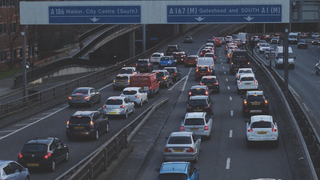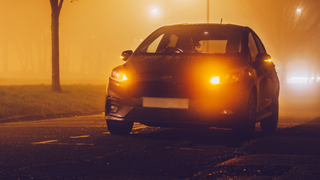It's so easy to find yourself in auto-pilot mode when you're driving, especially if you have experience behind the wheel.
But unfortunately, that doesn't excuse bad driving and with the number of cars on the road, you're bound to come across some on a regular basis.
Do you know your car's equity position? Find out yours today by signing up to Car Credible for a full car finance appraisal.
You've more than likely been guilty yourself of some of these habits because they can be so common, but although many of these may seem minor at the time of the offence, they can actually sometimes lead to major incidents.
We've taken a look at nine of the most common bad habits drivers have and what you can do to prevent yourself from being on the wrong end of another driver's poor decision-making.
Tailgating
Of the habits on this list, tailgating is definitely up there as one of the most dangerous habits some drivers have.
The intimidation of other road users is also very illegal and offenders can face severe consequences if they are caught.
Some drivers resort to this type of tactic on the motorway when a driver in front should move over to the left lane, while others can be found doing it in residential areas, or areas where the speed limit does not permit you to drive any faster than you're already going.
It can be dangerous not only for the person in front but the tailgater themselves. All it takes is for the front vehicle to slam on its brakes and the tailgater could smash right into the back of them as there's likely not enough reaction time.
This can be especially dangerous in poor weather conditions when visibility and grip on the road are considerably reduced.
The safest thing for you to do if you are being tailgated is to move over if that's possible to do so, and if it's not, reduce your speed so if there were to be any collision, the effects would be less damaging.
This may irritate the driver behind even more, but such is life and they should understand that they can't bully people off of the road.
Middle lane hogging
Once some drivers get into their groove on the motorway, they think it's okay to allow their attention span to dissolve away and sit in the middle lane because it saves them having to move over and then overtake again later down the road.
However, middle-lane hoggers can reduce the flow of traffic and cause jams if there are too many cars behind wishing to overtake, potentially causing accidents if vehicles try and overtake harshly when other vehicles are moving along it.
You could be hit with a £100 fine and three points on your license if caught by law enforcement.

Outside lane hogging
On the flip side, there are some that once they overtake are happy to sit on the outside lane with the same attitude those that hog the middle lane has.
However, once you overtake, you should expect to move back left again when it is clear and safe to do so, or risk causing tailbacks and more chance of creating a dangerous incident.
Undertaking
Unlike the two scenarios above, undertaking is the process of overtaking on the left, rather than the right.
This typically occurs when someone is hogging one of the left lanes and the only way to move past them is to overtake in a different lane.
It's technically not illegal but can cause serious accidents if the hogger isn't paying attention to their mirrors and try to move left themselves.
If you're undertaking someone because you feel they are driving too slow even at the correct speed limit, then you should look to overtake on the right, unless, of course, you are already in the outside lane where it's not possible.
Driving with full beams
This is a perfectly acceptable way of driving at night if you feel you need that extra bit of distance in your vision, particularly if driving through wooded areas or countryside where you're likely to find no street lights.
However, it is inconsiderate if you use full-beamed lights when driving towards an oncoming vehicle as the driver could be dazzled by your lights.
The courteous thing to do is dip your full beams - if you require them - if you see a vehicle approaching, and then reactivate them after you have passed.

Failing to indicate
This is one of the more common day-to-day habits you will encounter as so many people fail to complete this very simple manoeuvre.
It can be dangerous if you fail to signal where you're going for both oncoming vehicles, and those behind you.
Some people have just gotten lazy over time and can't be bothered to indicate, but that's absolutely no excuse, no matter how long you've been driving.
It's for the benefit of other road users than yourself and could prevent someone from causing damage to you if you give plenty of notice of what your intentions are.
Moving away slowly when the lights turn green
This is absolutely not illegal, but can still be pretty frustrating for those that are sitting behind you, especially if your slow action causes the lights to go red again before they've been able to pass.
It can also show that the driver is not paying attention which is dangerous in itself.
Last-minute braking
This is only permitted when trying to avoid an accident with another road user or if an incident such as a child running out in front of you occurs.
Slamming on your breaks to hinder tailgaters or for any reason other than to avoid an accident can result in points on your license, a fine, or even prison time.
The latter may seem a little over the top but if you're braking late to deliberately be hit by the driver behind so you can claim on their insurance, this could be perceived as a type of fraud.
Parking on the pavement
Drivers that park on the pavement and take up so much room that pedestrians can't pass are seriously frustrating.
It's inconsiderate and can be dangerous, especially for the elderly or disabled that may need to divert into the road to get around the vehicle on the path.
If you have to park on the pavement for whatever reason, at least try to ensure that there is enough room for people to pass.
We're sure that you have encountered many of these bad habits over the years and perhaps you even do some yourself now.
If that's the case, we certainly hope this article helps you to reevaluate that maybe you should try to be a bit more considerate...
We're certain there are many more habits that we've missed, so feel free to comment on some of the other more frustrating experiences you see when out on the road.
/dangerous-bmw-driver.png)


/car-tax-disc-image2.jpg)
/money-saving-tips.jpg)
/car-tax-sorn.jpg)